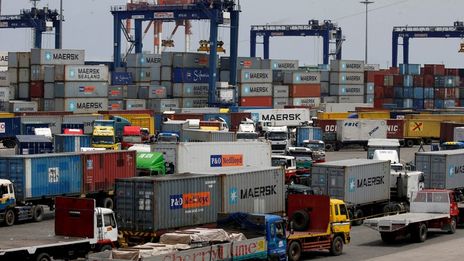By Kim Mackrael
OTTAWA--Canada recorded its largest trade surplus in more than a decade in November as exports and imports both hit record highs despite flooding that disrupted transportation on the country's west coast.
Statistics Canada said Thursday the country in November posted a goods-trade surplus of 3.13 billion Canadian dollars, the equivalent of US$2.45 billion. The consensus was for a C$2.1 billion surplus, according to economists at TD Securities.
The November data marked the highest trade surplus since September 2008.
The previous month's trade data were revised, and now indicate the goods-trade surplus was C$2.26 billion, compared with the previous C$2.09 billion estimate.
Exports rose 3.8% in November to reach a record level of C$58.57 billion, while imports increased 2.4% to a record level of C$55.44 billion. In the previous month, imports and exports also hit record levels.
On a volume--or price-adjusted--basis, exports rose 3.5% in November and imports increased 0.8%.
The data agency said that the gains in export and import data were fueled in part by large shipments of pharmaceutical products that entered Canada in November for packaging and labeling. The products were subsequently exported in the same month. Excluding pharmaceutical products, overall exports were up 2.8% in November and imports advanced 0.1%.
Exports of energy products rose 2.8% in November, marking a seventh straight monthly increase, and exports of forestry products and building and packaging materials increased 6.7%.
Some economists had anticipated that flooding on Canada's west coast in mid-November, which caused significant transportation disruptions, would weigh on the monthly trade data. Statistics Canada said exports from the province of British Columbia, where the flooding occurred, were down in the month but other provinces posted widespread increases.
Many Canadian jurisdictions reintroduced onerous economic restrictions in recent weeks in an effort to curb the spread of the Omicron variant of Covid-19. The provinces of Ontario and Quebec both delayed the start of school after the winter holidays and closed indoor dining rooms, among other changes.
The overall advance in the trade surplus in November is "another sign that the flooding in British Columbia had only a small impact on overall economic activity," Capital Economics economist Stephen Brown said. "It confirms that the economy headed into the latest lockdowns in a stronger position than we initially expected."
Write to Kim Mackrael at kim.mackrael@wsj.com
(END) Dow Jones Newswires
01-06-22 0945ET



























